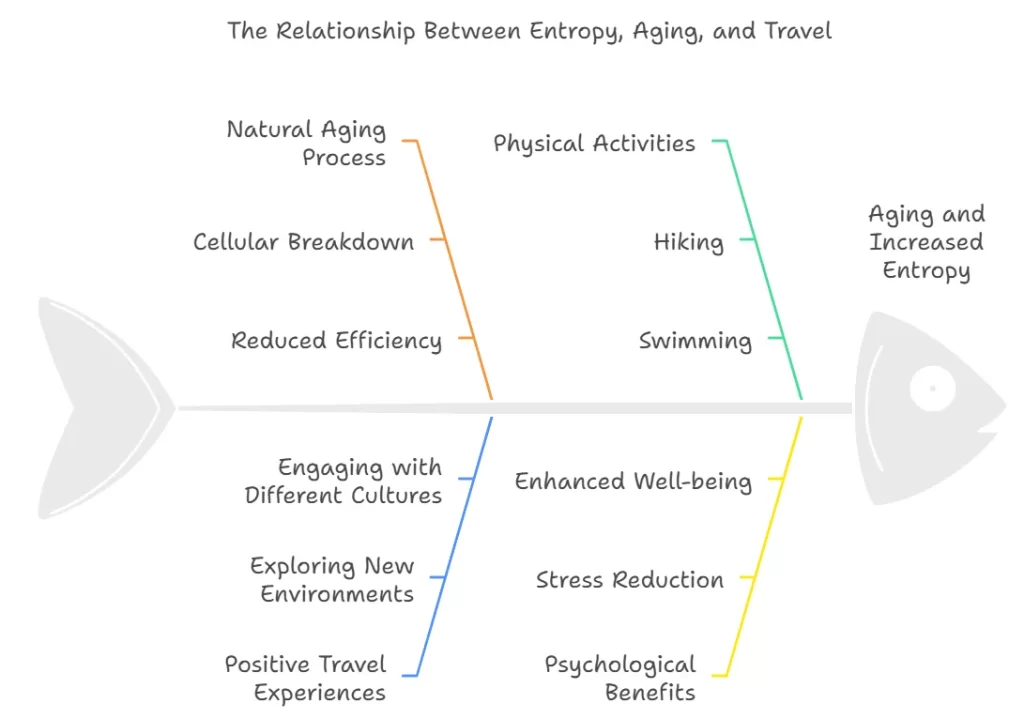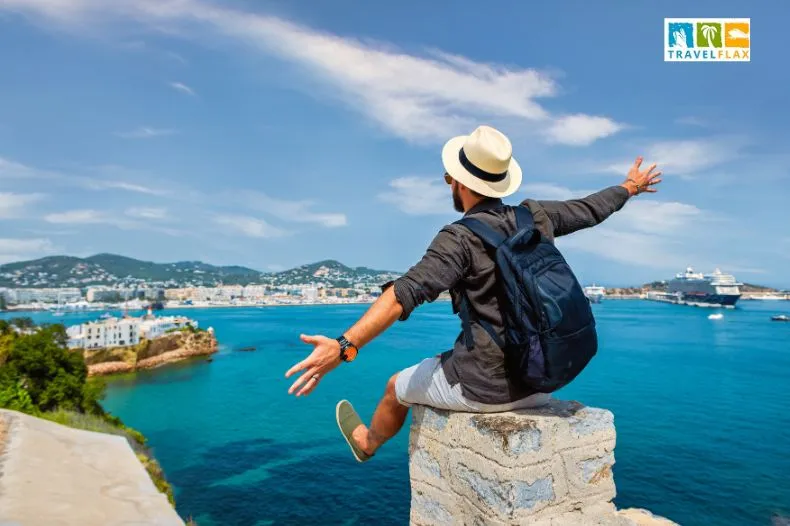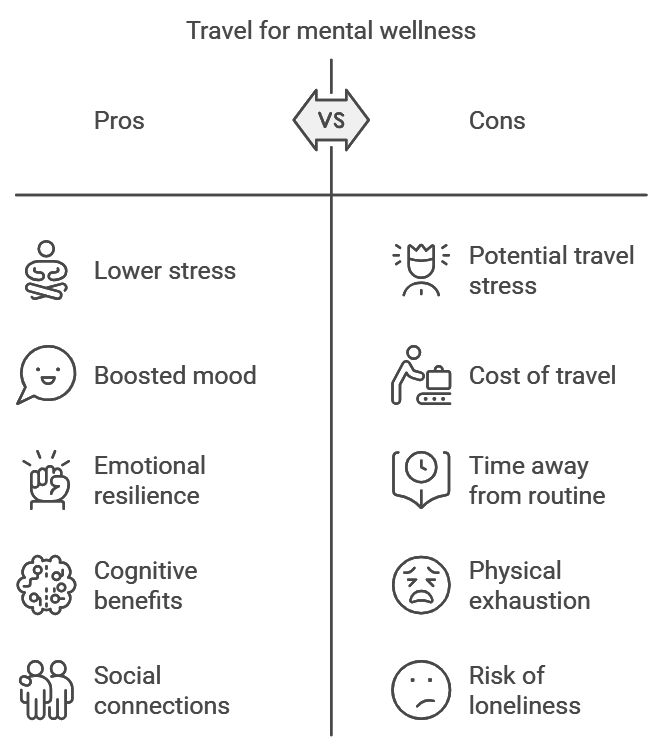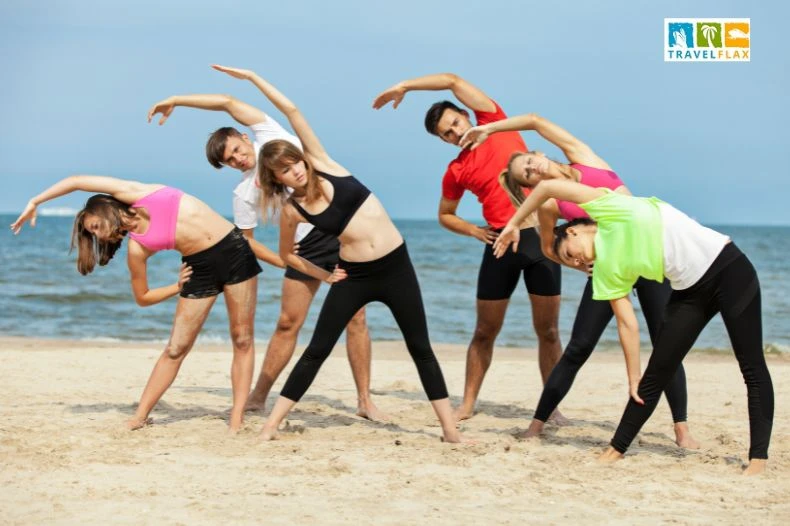
Can Travel Prevent Aging? There’s mounting evidence that it might, as there’s a certain joy that comes with the mere thought of a getaway: the thrill of booking a flight, packing your suitcase, and the anticipation of exploring new destinations.
The exhilaration that accompanies travel is universal – it rejuvenates the spirit, refreshes the mind, and for many, it’s an opportunity to escape from the grind of everyday life.
But what if I told you that this indulgence may not only offer a mental boost but also have a lasting impact on your body’s aging process? That’s right. According to recent research, your dream holiday could help slow down the inevitable march of time.
A pioneering study conducted by Edith Cowan University in Australia has uncovered some fascinating insights into how travel can affect the aging process.
The research, which applies the scientific theory of entropy to tourism for the first time, suggests that travel offers a surprising range of health benefits – one of the most intriguing being the potential to slow down aging.
So, if you’ve ever wondered if your next holiday could make you feel—and look— younger, this study may offer the answer.
What Is Entropy and How Does It Relate to Aging?

Before we dive into the findings of the study, let’s first understand the concept of entropy. Entropy is a fundamental concept in physics, often described as the universe’s natural tendency towards disorder and decay.
In the simplest terms, it measures the amount of energy in a system that is unavailable to do work. A high-entropy system is one that is disordered and chaotic, while a low-entropy system is organized and efficient.
When it comes to the human body, entropy plays a role in the aging process. As we age, our bodies experience an increase in entropy – our cells, tissues, and organs become more disordered and less efficient.
Essentially, higher entropy is associated with the gradual breakdown of physiological functions, leading to the physical signs of aging like wrinkles, reduced muscle mass, and slower metabolic processes.
However, what the research by Edith Cowan University suggests is that the positive experiences associated with travel – such as exploring new environments, engaging with different cultures, and even physical activities like hiking or swimming – could help mitigate this increase in entropy.
In other words, traveling to a new place might actually help keep our bodies in a low-entropy state, slowing the aging process.
Travel, Positive Emotions, and Physical Health

Fangli Hu, the principal researcher behind the study, emphasizes that while aging is an irreversible process, it doesn’t have to happen at the same pace for everyone. The key, according to Hu’s research, lies in positive travel experiences.
These include exposure to novel environments, interactions with new people and cultures, and participating in physical activities that are often part of a travel experience. These activities can trigger positive emotions, which in turn may help slow down the rise in entropy, fostering a healthier, more youthful body and mind.
“Put simply,” explains Hu, “the self-defense system becomes more resilient. Hormones conducive to tissue repair and regeneration may be released and promote the self-healing system’s functioning.”
This means that traveling isn’t just a way to relax and unwind – it could actually promote the regeneration of cells, improve the functioning of bodily systems, and support long-term physical health. This rejuvenation is especially significant when we think about how our bodies handle stress.
Chronic stress is a major contributor to aging, and taking a break from the daily pressures of life – whether through a holiday or an adventurous journey – can allow the body to reset, reducing stress and its damaging effects.
The Benefits of Travel on Mental Wellness

While the physical health benefits of travel are clear, the mental wellness advantages are equally compelling. Positive emotions like excitement, joy, and wonder can lower cortisol levels (the stress hormone) and promote the release of dopamine, the “feel-good” hormone.
These psychological benefits are not only temporary mood boosts but can have a lasting impact on our overall well-being. Positive emotions fostered by travel can lead to better emotional resilience, lower rates of depression, and improved cognitive function.
One of the key findings from the study is that travel often involves stepping out of one’s comfort zone – whether it’s navigating an unfamiliar city or trying new activities. This engagement with new experiences can help keep the brain sharp and adaptable, qualities that are crucial as we age.
It’s no coincidence that many people return from their holidays feeling rejuvenated, as though they’ve had a mental and physical reset.
What’s more, the connections we make with new people during travel can also boost our mental well-being, providing social interaction that may counteract feelings of loneliness or isolation.
Physical Activity on Holiday: A Key Factor in Longevity

It’s no secret that physical activity is essential for maintaining health as we age. But traveling often involves more than just lounging by the pool or sitting at a café – it can be an opportunity to engage in active pursuits that promote longevity.
Hiking through a national park, swimming in the ocean, or even walking through the streets of a foreign city all contribute to physical activity that has long-term benefits for the body.
Studies have shown that regular physical activity can reduce the risk of chronic diseases, such as heart disease, diabetes, and obesity, while also improving mobility, flexibility, and muscle strength.
When you combine this with the rejuvenating effects of a holiday – the relaxation, the exposure to nature, and the joy of experiencing something new – it’s easy to see how travel can play a role in slowing the aging process.
Travel provides an opportunity for people to engage in different types of physical activities that they might not incorporate into their daily lives. Whether it’s hiking through the Alps, practicing yoga on a serene beach, or kayaking on a tranquil lake, travel encourages movement in ways that can help maintain a youthful body.
A Break from Stress: How Time Away Can Enhance Your Longevity

Perhaps one of the most significant ways that travel can slow aging is by providing a much-needed break from the stresses of daily life. The demands of work, family, and societal expectations can take a toll on both our physical and mental health.
Chronic stress has been linked to numerous health problems, including increased inflammation, a weakened immune system, and an accelerated aging process.
When we travel, we temporarily disconnect from these stressors. The experience of exploring new places, meeting new people, and engaging in leisurely activities allows the body and mind to relax, promoting healing and regeneration.
This reduction in stress can lower blood pressure, reduce the risk of cardiovascular disease, and improve sleep – all of which contribute to a healthier, more youthful body.
Is Travel the Fountain of Youth?
While it may be overly simplistic to claim that travel is a literal fountain of youth, there’s certainly evidence to suggest that regular holidays and positive travel experiences can play a role in maintaining physical and mental vitality.
The study from Edith Cowan University highlights the positive effects of travel on reducing entropy, improving resilience, and promoting overall well-being. Whether it’s through exposure to new environments, physical activity, or simply a break from the daily grind, the benefits of travel are clear.
For those seeking to slow down the aging process, travel offers an accessible and enjoyable way to do so. So, the next time you book that long-awaited vacation, you can feel confident knowing that your investment in a little time away might just lead to a longer, healthier, and more youthful life.
After all, who wouldn’t want to experience the rejuvenating effects of a holiday while simultaneously giving the body a chance to defy the aging process?
Conclusion: Embrace Travel for a Healthier, More Youthful Life
In today’s fast-paced world, finding ways to slow down the aging process can feel like a never-ending search for the elusive secret to longevity.
But as research continues to uncover the surprising health benefits of travel, it’s clear that taking time to explore new destinations, engage with different cultures, and embrace the physical activities that travel often entails can be an essential part of maintaining youthfulness.
So, whether you’re hiking through rugged mountains, swimming in crystal-clear waters, or simply immersing yourself in a new city, know that the joy you’re experiencing isn’t just making your spirit feel young – it might also be helping to keep your body youthful for years to come.
The next time you book that dream holiday, remember: you’re not just taking a break from life’s stresses – you’re investing in a longer, healthier, and more vibrant future.
